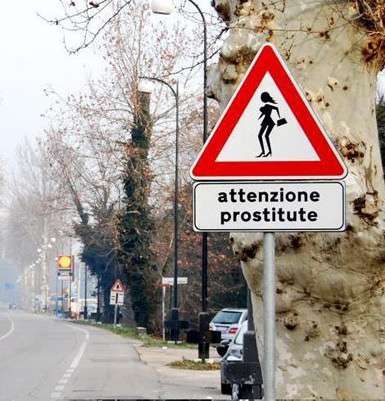Calif. to Open Victim Compensation Funds to Prostitutes
Will be able to get help with costs if attacked on the job


The growing trend of treating prostitutes as though they're victims of sex-trafficking even when they aren't is paternalistic and often forces women into mandatory "treatments," unwilling to acknowledge a person's free choice to engage in sex work. Cathy Reisenwitz detailed in October how this shift of treating prostitutes as victims rather than criminals doesn't necessarily result in more freedom or better lives for the women forced to participate in order to avoid criminal charges.
On the other hand, the growing trend of treating prostitutes as though they're victims rather than criminals can result in prostitutes being able to turn to the state for help when they truly are victimized. California has a Victim Compensation and Government Claims Board that, among other things, helps pay for medical treatment and certain losses that are directly connected to a crime. For example, a woman who has been sexually assaulted can turn to the agency to help pay for medical and mental health treatment to recover from the crime.
The laws, though, exempt victims who were involved in illegal activities at the time, such as prostitution. A prostitute who was raped could not turn to the state for assistance with health care costs.
Today the agency voted to change that rule. The Sacramento Bee reports:
California's three-member Victim Compensation and Government Claims Board voted unanimously Thursday to overturn a regulation barring victims of sexual assault from receiving restitution if they work in the sex trade.
The 14-year-old policy states that victims of a violent crime may be denied compensation if they were involved in the events leading up to that crime, including mutual combat, illegal drug-related activity, gang-related activity and prostitution.
Advocates for sex workers argued that the regulation was discriminatory, essentially blaming prostitutes for their own rape and putting other women at greater risk of attack.
Of course, the change comes at the speed of government. The new policy probably won't be in place until next spring.
Editor's Note: As of February 29, 2024, commenting privileges on reason.com posts are limited to Reason Plus subscribers. Past commenters are grandfathered in for a temporary period. Subscribe here to preserve your ability to comment. Your Reason Plus subscription also gives you an ad-free version of reason.com, along with full access to the digital edition and archives of Reason magazine. We request that comments be civil and on-topic. We do not moderate or assume any responsibility for comments, which are owned by the readers who post them. Comments do not represent the views of reason.com or Reason Foundation. We reserve the right to delete any comment and ban commenters for any reason at any time. Comments may only be edited within 5 minutes of posting. Report abuses.
Please to post comments
No one ever freely chooses to engage in sex work. The radfems tell me so.
Also, all heterosexual sex is rape by the male.
So I have to assume that male homosexual sex is double rape. Not rape rape, but RAPE RAPE, or RAPE SQUARED. But since both men are also victims, it evens out.
I wish I was as stupid as the people who come up with all this shit. It must be so much easier to go through life too retarded to worry about being retarded.
I believe Jessie has had someone tell him that gay porn is still degrading to women because it makes it seem like women aren't necessary or something. So I wouldn't be surprised if someone really did say something like that.
Pretty much. Although male homosexuality being misogynistic is hardly a new idea, and the claimed reason lesbians did a hostile takeover of the feminist movement (the lavender menace*) is that the gay rights movement (allegedly) treated them as glorified secretaries.
*Lavender Menace:
"Hey, Betty Friedan, send a little of that lotion my way!"
Please don't think radfems are representative for the feminist movement. They are regarded as kinda cultish. Especially their bigoted opinions about transsexuals are despised by other feminists.
When I saw the headline, I assumed this would be something very paternalistic and oppressive. Turns out I was wrong, which was a very pleasant surprise.
Until I saw the headline, I couldn't believe I could make so much money without getting out of bed!
This doesn't even begin to scratch the surface. The strategy, used by anti-prostitution crusaders, of defining prostitutes as defacto victims is transparently self-serving and hypocritical. Liberal feminists, who essentially define themselves as the only permissible model of honorable womanhood, cannot be champions of women's rights while, at the same time, opposing the rights of women to control their own bodies and define, for themselves, the terms under which they engage in sex. The only way they can reconcile that contradiction is if they simply declare that all sex workers are coerced and therefore victims. And when women inconveniently argue that they are sell sex by choice? Well, prohibitionists just dismiss them as being in denial. It would be almost impossible to top that as an insult to the intelligence of women.
The anti-prostitution movement is the definition of a crusade that exists totally for itself. They are an example of people who are capable of rationalizing anything to advance their agenda.
If they really championed women's rights, they would would be aggressively advocating that women who sell sex voluntarily should be free to do so with the same legal rights as any other business.
Sing Sung says that aint never goonna happen, ever man.
http://www.Privacy-Planet.com
Dang it, all the do-gooders, they NEVER seem to notice that for every MALE dancer at Chippendales, stage name "Willie, Willie, Whippin' Free", who gets to further his career dreams and make tit-loads of money, screamin' babes stuffin' 100-$ bills under his G-string? That there are 50 or 100 BABES doing the same thing, on the opposite side of the "glass-ceiling"!!! If I didn't know better, it is as if what the FEMALE sex has to offer is worth more than what the MALE sex has to offer! What, I ask you, WHAT is the ratio of male heterosexual prostitutes and male naked-dwonky-dancers, to FEMALE heterosexual prostitutes and female naked-titty-dancers!!?? I rest my case? It is HIGH TIME to get the EEOC and all the Government-Almighty-empowered lawyers in here, and SUE THE HECK out of all the naked titty dancers, till the numbers are equal! If all else fails, the patrons of the naked tiity dancer saloons must be forced to go watch the male naked dwonky dancers, in the name of "diversity"!!!
OK, on 2nd thought? The OTHER option is to subsidize the naked dwonky dancers, even if we have to fill the patron's chairs with effigies or robots, and THEN the numbers will be the same! It's all about EQUALITY, right? Income equality for the sexes, in "sex work"!!!! I DEMAND it!!!
OK, I got it now!!! Male prostitutes should be paid (by Government Almighty) to hump their effigies (pillows for example) until the numbers are equal! Problem solved!
We can do it like college sports.
Strip clubs are only allowed to hire as many female dancers and waitresses as they hire male ones. Male dancers and waitresses don't actually have to dance or wait tables, just get payed for it in order to make quota.
Related essays from Cato
So apparently in bell'Italia we don't call them puttane anymore? Or was that the politically incorrect version all along?